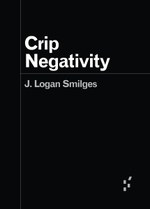Calling Up Justice recommends texts for liberation and empowerment. These texts are recommended by Calling Up Justice participants in our online spaces. The following text was recommended during a session of Dis/Rep 2023.
Crip Negativity
Imagining anti-ableist liberation beyond the rubrics of access and inclusion
In the thirty years since the Americans with Disabilities Act was signed into law, the lives of disabled people have not improved nearly as much as activists and politicians had hoped. In Crip Negativity, J. Logan Smilges shows us what’s gone wrong and what we can do to fix it, imagining what horizons might exist for the liberation of those oppressed by ableism—beyond access and inclusion.
In the thirty years since the Americans with Disabilities Act was signed into law, the lives of disabled people have not improved nearly as much as activists and politicians had hoped. In Crip Negativity, J. Logan Smilges shows us what’s gone wrong and what we can do to fix it.Leveling a strong critique of the category of disability and liberal disability politics, Smilges asks and imagines what horizons might exist for the liberation of those oppressed by ableism—beyond access and inclusion. Inspired by models of negativity in queer studies, Black studies, and crip theory, Smilges proposes that bad crip feelings might help all of us to care gently for one another, even as we demand more from the world than we currently believe to be possible.
J. Logan Smilges is assistant professor of English language and literatures at the University of British Columbia and author of Queer Silence: On Disability and Rhetorical Absence (Minnesota, 2022).

